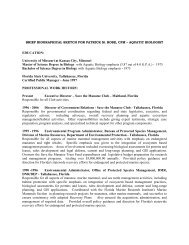PDF Download - Society of Environmental Journalists
PDF Download - Society of Environmental Journalists
PDF Download - Society of Environmental Journalists
Create successful ePaper yourself
Turn your PDF publications into a flip-book with our unique Google optimized e-Paper software.
Book Shelf<br />
Reviewed by JENNIFER WEEKS<br />
A compelling case for how we must<br />
decrease our oil dependence<br />
Blowout in the Gulf<br />
The BP Oil Spill Disaster and<br />
the Future <strong>of</strong> Energy in America<br />
by William R. Freudenburg<br />
and Robert Gramling<br />
MIT Press, 2010, $18.95<br />
Blowout in the Gulf starts and ends with BP’s oil spill in the<br />
Gulf <strong>of</strong> Mexico, but it’s really about something much bigger:<br />
America’s unrealistic thinking about oil. In the Gulf and elsewhere,<br />
the authors argue, “we have been getting into increasingly<br />
dangerous waters without being sufficiently vigilant about the<br />
implications <strong>of</strong> our actions.” They use the BP spill to show how<br />
bankrupt that approach is, and to argue for rethinking our national<br />
culture <strong>of</strong> oil consumption.<br />
The late Bill Freudenburg (commemorated on page 5 <strong>of</strong> this<br />
issue <strong>of</strong> SEJournal) and his coauthor, University <strong>of</strong> Louisiana sociologist<br />
Robert Gramling, wrote many books and articles<br />
together and separately examining how we think about natural<br />
resources, and how those perceptions drive environmental<br />
policies. Drawing on the field <strong>of</strong> risk studies, they point out<br />
connections between the BP spill and other disasters. While the<br />
Macondo well’s blow-out preventer failed to work, Freudenburg<br />
and Gramling point to an even bigger problem: humans who<br />
assumed it was fail-safe.<br />
For example, cost-cutting by BP, Transocean and Halliburton<br />
reduced safety margins and reduced the number <strong>of</strong> barriers against<br />
a well blowout on the Deepwater Horizon as its crew was closing<br />
down the well. The rig’s strong safety record convinced company<br />
<strong>of</strong>ficials that it was a state-<strong>of</strong>-the-art system, but in practice it was<br />
operating with many important safety features disabled. And<br />
federal regulators accepted the numbers and assumptions in BP’s<br />
spill response plan without asking any questions.<br />
But as the authors see it, the problem is broader. They shift<br />
their focus to the history <strong>of</strong> the U.S. oil industry, noting how<br />
policymakers gave it generous subsidies and tax breaks for<br />
decades (and charged lower royalties on oil production than<br />
almost any other nation). And they recount how presidents from<br />
Nixon to Obama have pledged to reduce U.S. dependence on<br />
imported oil, even as our dependence on foreign sources has risen<br />
to over 66 percent <strong>of</strong> total U.S. oil use.<br />
“Our expectations for the future continue to be shaped by the<br />
exuberance <strong>of</strong> the past,” they write. “We seem to have become so<br />
caught up in the excitement <strong>of</strong> oil strikes that we’ve started to<br />
share the wildcatters’ conviction — surely, there must be even<br />
more spectacular finds out there, perhaps just beyond the<br />
next horizon.”<br />
That’s especially true in Louisiana, as Freudenburg and<br />
24 SEJournal Spring 2011<br />
Gramling learned when the Interior Department’s Minerals<br />
Management Service commissioned them in 1990 to study public<br />
risk perceptions <strong>of</strong> <strong>of</strong>fshore oil development. MMS wanted to<br />
understand why some states, like California, strongly opposed<br />
broader <strong>of</strong>fshore oil leases. Freudenburg and Gramling concluded<br />
that many factors made Louisiana unusually receptive to <strong>of</strong>fshore<br />
oil production. The industry developed there in the 1930s and<br />
1940s, well before the first environmental laws were passed, and<br />
in parallel with the expansion <strong>of</strong> the local fishing industry. Few <strong>of</strong><br />
the state’s residents live near the coast, which is marshy and hard<br />
to access by road. The region’s economy was dominated by<br />
extractive industries, and average levels <strong>of</strong> education were<br />
relatively low in southern Louisiana, a finding that usually<br />
correlated with lower-than-average environmental awareness.<br />
These findings suggested — correctly — that <strong>of</strong>fshore<br />
drilling would be a much tougher sell on the east and west coasts<br />
than in Louisiana. What’s more, policies initiated during the<br />
Reagan administration by Interior Secretary James Watt (so-called<br />
“area-wide leasing”) vastly expanded the amount <strong>of</strong> territory<br />
<strong>of</strong>fered for oil exploration. Only the biggest companies could<br />
afford to do seismic surveys on massive <strong>of</strong>fshore tracts, so small<br />
producers were crowded out <strong>of</strong> the Gulf, and corporations like BP<br />
came to dominate the region.<br />
Putting this all together, Freudenburg and Gramling conclude<br />
that federal <strong>of</strong>fshore energy policies have emphasized “the<br />
transfer <strong>of</strong> valuable, resource-rich undersea lands from the general<br />
public to a handful <strong>of</strong> the richest corporations in the history <strong>of</strong><br />
money.” Given that oil is a finite resource, and that a growing<br />
share <strong>of</strong> what’s left lies in hard-to-reach places (like ultradeepwater<br />
formations), they argue that it’s time to start reducing<br />
our oil dependence. They don’t lay out a detailed energy plan,<br />
which is beyond the scope <strong>of</strong> this book, but they do build a<br />
powerful case that we need to make better choices.<br />
Freelancer Jennifer Weeks lives and writes in Watertown, Mass.<br />
Reviewed by CHRISTINE HEINRICHS<br />
Peek into the world <strong>of</strong> animal<br />
smugglers proves fascinating<br />
and powerful<br />
The Lizard King:<br />
The True Crimes and Passions<br />
<strong>of</strong> the World’s Greatest<br />
Reptile Smugglers<br />
by Bryan Christy<br />
Twelve, Hatchette Book Group,<br />
New York, 2008<br />
Paperback edition $13.99<br />
This is a book about passions and the men whose souls<br />
are gripped by them: the passion to collect rare animals, the<br />
passion to make money, the passion to defend wildlife and collar<br />
the criminals.<br />
Lizard King author Bryan Christy, an SEJ member, gives a<br />
good guys-bad guys account <strong>of</strong> reptile smugglers and the special












